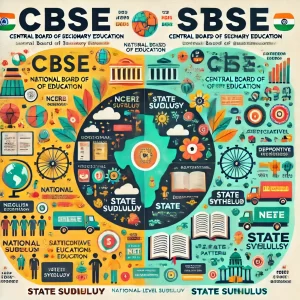What is difference between CBSE and State Syllabus?
The difference between CBSE (Central Board of Secondary Education) and State Syllabus mainly lies in the curriculum structure, difficulty level, focus areas, and examination patterns. Here’s a comparison:
1. Governing Body
- CBSE: Managed by the Central Government of India (NCERT syllabus).
- State Syllabus: Managed by the respective State Government’s Education Board (varies by state).
2. Curriculum & Focus
- CBSE:
✅ National-level standardized syllabus.
✅ Focuses on conceptual learning & application-based knowledge.
✅ Suitable for students preparing for national-level exams like JEE, NEET, UPSC, etc. - State Syllabus:
✅ Syllabus varies from state to state.
✅ Focuses more on regional topics and state-level relevance.
✅ May emphasize rote learning over conceptual understanding.
3. Medium of Instruction
- CBSE: English & Hindi (widely used across India).
- State Syllabus: Available in English and regional languages (like Telugu, Tamil, Kannada, etc.).
4. Difficulty Level
- CBSE: More analytical & competitive, aligned with national-level exams.
- State Syllabus: Can be easier but depends on the state board.
5. Exam Pattern & Evaluation
- CBSE:
✅ Continuous assessment with MCQs, conceptual questions, and application-based papers.
✅ Uniform evaluation pattern across all CBSE schools. - State Syllabus:
✅ Exams may focus more on theory-based, descriptive answers.
✅ Grading and evaluation vary by state.
6. Recognition & Career Opportunities
- CBSE:
✅ Widely accepted across India & abroad (especially for competitive exams).
✅ Ideal for students who frequently relocate due to job transfers. - State Syllabus:
✅ Beneficial for state government jobs and entrance exams based on the state syllabus.
Which One is Better? 🤔
✅ Choose CBSE if your child aims for national/international exams, conceptual learning, and a structured syllabus.
✅ Choose State Syllabus if your child is preparing for state-level jobs, wants regional language studies, or if affordability is a concern.
